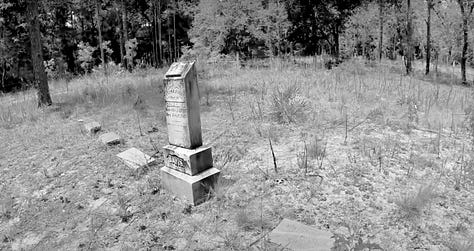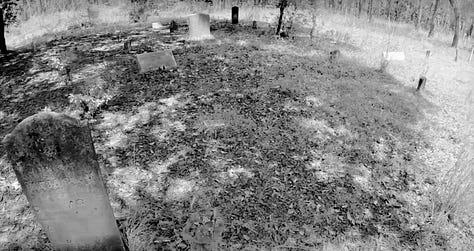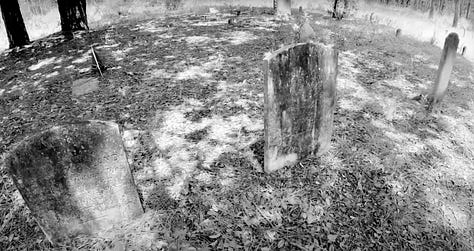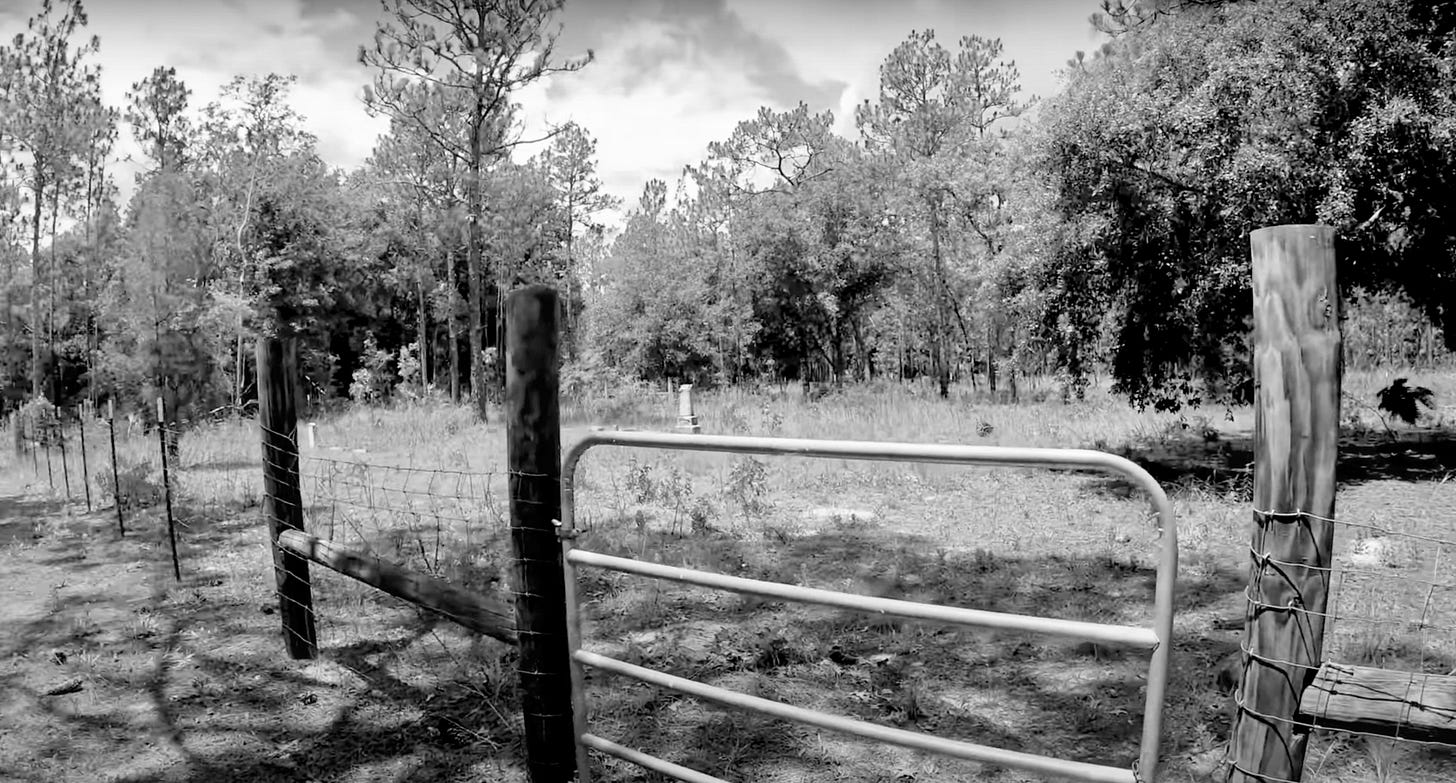Pt 35 Where the Forest Remembers
Beneath the moss and morning light, Indian Lake Cemetery holds echoes of Florida’s earliest settlers—and the sacred stillness of the ones who came before them.
There’s a moment, mid-hike, when the breeze stills, the birds quiet, and something shifts—something subtle but unmistakable. That’s how I knew I was close. The trail curved, the trees spaced wider, and the sunlight filtered in just a little differently. Then I saw it: the hush of memory pressing through the trees. I had found Indian Lake Cemetery. Not by searching, but by listening. The land had something to say. And I was finally still enough to hear it.
Need to catch up?
Pt 32 Alligators, Monkeys and the Creature from the Black Lagoon, OH My
Or, Start from the beginning
Marked by a simple wired fence and a weathered metal gate, the site felt humble yet deeply significant. Inside, tombstones leaned quietly beneath the canopy, some worn nearly smooth by time, others still bearing names etched in fading letters. The forest here didn’t whisper—it remembered.
Before the arrival of American settlers, the land surrounding Indian Lake was home to Native American communities, including the Ocale and Acuera tribes, both part of the larger Timucua-speaking peoples. They regarded the lake and its environs as sacred. Ceremonies were held here. Ancestors were buried in revered places throughout the forest. This land held memory long before any written history tried to name it.
In the mid-1800s, with the influx of settlers forcibly displacing the original stewards, a small whitewashed church was built to anchor a fledgling community. That church is long gone—faded into the forest’s memory—but what remains is the cemetery.



Inside, the grave markers are aged, some worn nearly smooth by time, others still bearing the names of settlers and soldiers from the 1800s. They rest mostly beneath the watchful, protective energy of the trees, their stones tilted gently by roots and seasons. These names still echo through the leaves—faint reminders of lives lived—but frustratingly, little history remains about the people themselves. Who were they? What dreams did they carry into this untamed land? What did they leave behind besides names carved in stone? The forest remembers, even if the records don’t:
Charity Frances "Little Granny" Watson Luffman (1801–1880), wife of Rev. William Luffman
Lt. William H. McCardell (1826–1871), 2nd Florida Cavalry
Peter E. Coolsey (1830–1893), 9th Florida Infantry
Mary Martin (1806–1851), wife of Emmanuel Martin
Saraha Forbs Davis (1845–1913), wife of C.E.O.H. Davis
I closed the gate behind me and headed back to the trail as it transformed again into blinding white sand, soft and warm beneath my feet.

This is all that is left of Florida’s ancient dune system, relic of a time when seas covered this land. Few plants grow here, but the view is wide and bright. The lake now reflected the sky like glass. I sat in the sand, alone and entirely at peace. The silence wrapped around me like a soft shawl. Feeling the sun’s growing intensity, I reached for my water bottle—grateful for the chill it still held. The cold water slid down my throat, a small, perfect mercy that seemed to tame the rising heat radiating from the sand and sky. It was a quiet, satisfying moment—simple, grounding, and deeply human.
Across the lake, early hikers began to arrive. The spell lifted. The forest shifted. Its secrets tucked themselves away again, waiting for sunset. It was time for me to go—so I could soak up a few final moments of nature’s hush before their chatter and footsteps made it around the loop.
One last sip of water. I stood up. As I brushed the sand from my pants, I couldn’t help but think of the spider. I wondered who was going to do a full faceplant into that magnificent web. I’m sorry (well… not really), but I did chuckle—imagining someone erupting in the kind of primal shriek that comes from a place so deep, even they wouldn’t know they had it in them. Flailing, spinning, checking every inch of their body to make sure the eight-legged architect wasn’t hitching a ride. Honestly, if someone had a camera rolling, that would be YouTube gold. Golden button kind of gold.
As I came around the far side of the lake, the terrain shifted once again, as if the forest had flipped the page in its own novel. Gone is the blinding white sand. In its place, tall wetland grasses rise up, waving gently in the breeze. These plants thrive near the water’s edge, creating a dense, almost jungly barrier between trail and lake.
I was happy for the shade once again. I paused for a sip of water and looked out over the edge of the trail where pickerelweed, sawgrass, and the occasional delicate Blue Violet stood like quiet earth sentinels. That little pop of color made me smile. I’ve always loved small plants. I admire the way they thrive quietly, overlooked by most, yet carrying a profound humble energy that somehow warms the soul. They don’t need to be loud to be seen. They just are. Quiet. Beautiful. Just enough.
My thoughts are interrupted with the rustle of life in motion. Toads, frogs, and tiny lizards dart across my path like nature’s popcorn, wild and unpredictable.I paused for a while, crouching low to catch the tiny toads, no bigger than the tip of my baby finger, perfectly camouflaged in the black-and-white wet sand. I let them go, smiling to myself—quietly thrilled that even in my fifty-something-something, I still have my childhood knack. The trees, it seems, remember who I was before I grew up—and in that moment, they gently handed her back to me.
This side of the lake hums with life. Dragonflies buzz overhead in quick zips of iridescent light. Butterflies flit and flirt through beams of sunlight that filter between branches. The trees begin to close in again, offering pockets of shade and that welcome relief from the hot Florida sky. Their trunks stand like pillars, guiding me toward something familiar.
Just ahead—I realise , the glint of metal from the swinging chair, swaying gently as if it, too, has been waiting for my return. The loop is complete. But somehow, everything has changed. The lake is still the same. But I have experienced my first walk in Florida. I walked with spiders, listened to trees, spoken to toads, touched history, and watched the sunrise in the most sacred of spaces alone.
This wasn’t just a one-time walkabout. Indian Lake became my daily walk when I was not off adventuring. A ritual that grounded me, whether I started early in the morning, breathing in the earthy silence before the world stirred, or came back in the evenings to catch the sunset.
Both times held their own kind of enchantment. In the morning, dew clung to the tall grasses, and spiderwebs shimmered like threadbare lace in the slanting light. In the evening, the forest changed her tone. Everything slowed. The way the last light filtered through the trees, reflected off the water, and turned the lake into a pool of liquid gold. Pure magic. As the sun dipped low, the forest hushed. Shadows grew long. Birds found their roost. Frogs came alive with their songs. And I always found myself still, listening.
All through the summer, I walked that loop nearly every day and watched the forest transform. The lake felt alive and overflowing, green and lush, pulsing with summer’s humidity. In the heat of the humid summer were heady with heat, filled with the electric buzz of cicadas, the scent of warm pine needles, and trails that shimmered in the sun. With the hint of a Florida Autumn, something shifted. The mornings cooled slightly. Leaves crisped at the edges. The vibrancy mellowed. Even the frogs sounded softer and the lake, like the forest, seemed to exhale, settling into a slower rhythm.
Back in 2020, the trail felt a bit wilder. You could still lose your footing on weathered wood. The cemetery was easier to miss. There were no designated campsites, and the trail signs felt more like hints than directions. But now, in 2025, the changes are both subtle and respectful. The boardwalk has been replaced with a full wooden bridge that guides you gently through the cypress without disturbing their tangled grace. Or perhaps keeps one safe from the clutches of the Swamp Thing. The Indian Lake Cemetery is now marked, maintained, and given the reverence it deserves, complete with a kiosk and map, so history doesn’t remain hidden. New primitive campsites allow overnight guests to sleep under the stars just outside the lake’s whispering edge, and fresh signage and markers throughout the forest help you move confidently through its changing moods.
And all along the way are the picnic areas and benches, those quiet, shady spots with their humble wooden tables. They're perfect for resting, writing, birdwatching, or just listening to the wind gossip with the trees. Even the squirrels have learned these are places where stories and snacks tend to gather.
From swinging chairs under cathedral oaks, through the hush of cypress wetlands, across sun-bleached white sands, and into frog-filled grasses and sunset shores, my journey around Indian Lake wasn’t just a walk. It was a ritual. A season of remembering what it means to move with nature instead of rushing through it. A quiet agreement between me and the land: if you show up with presence, I’ll show you my magic. And it did. Every single day. I can understand now why the native guardians of this land considered it sacred.
If you have not subscribed yet, why not? Subscribe and you will be alerted as soon as the next story drops and it will come effortlessly into your inbox or an alert on the app every Wednesday morning. So, hit that blue button right there and subscribe now. Thank you!
Once you do that and are feeling all kinds of fuzzy feels, how about tipping the Tipsmobile?
If my adventures and stories are bringing a smile to your face, why not throw a little fuel in my tank to keep the wheels turning —literally! Even creativity needs a top-up now and then! Your support keeps me inspired, and rolling down the road. Thanks for being part of the journey!
Need to catch up?
Pt 32 Alligators, Monkeys and the Creature from the Black Lagoon, OH My
Or, start from the beginning
Thank you for tuning in and reading this. I super appreciate you.
~Karen







